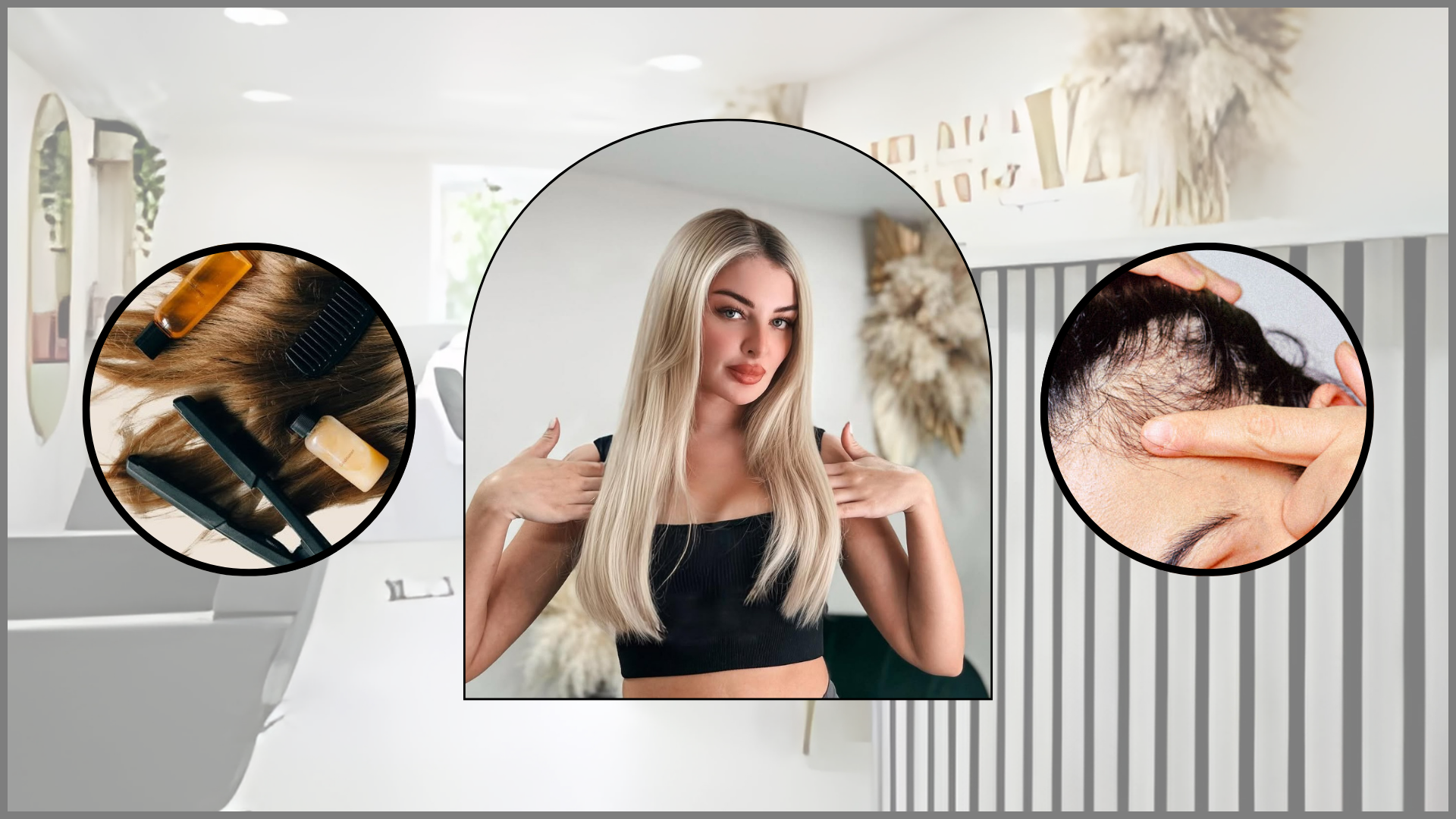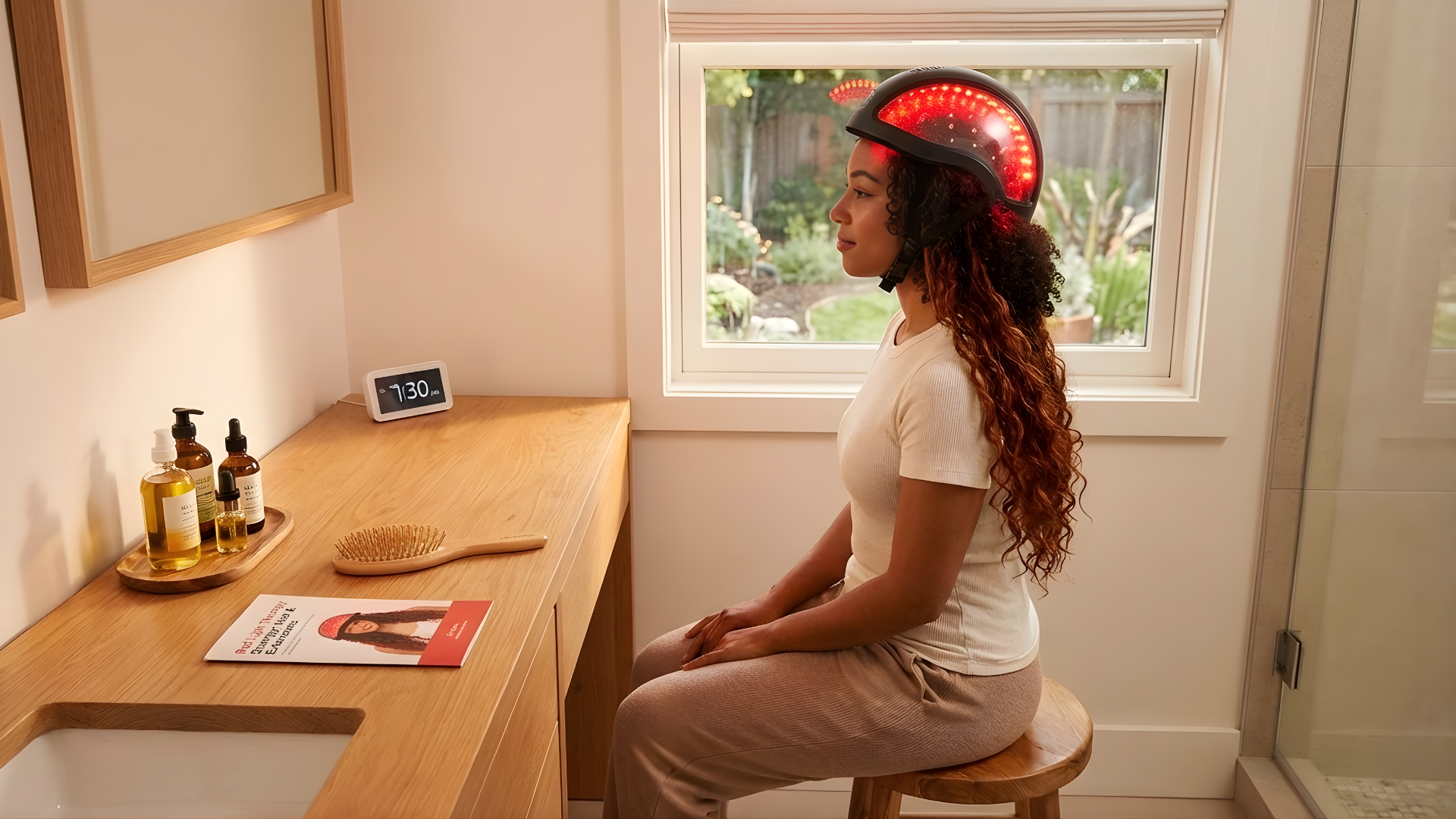If you’ve ever longed for fuller, longer, or more glamorous hair but struggle with a sensitive scalp, you’re not alone. Many people assume that a delicate scalp automatically rules out hair extensions, but that’s not necessarily true. With the right approach, careful choices, and expert guidance, there are effective Sensitive Scalp Solutions that make it entirely possible to enjoy extensions without irritation or discomfort.
This blog is your go-to guide from a Hair Extension Salon London when it comes to hair extensions. We’ll look at why sensitivity happens, the extension methods that are best suited for delicate scalps, and the practical steps you can take to protect your comfort while still achieving the hair of your dreams.
Why Do Some People Have a Sensitive Scalp?
Scalp sensitivity isn’t just about “tenderness.” It can show up in many ways, from itchiness and dryness to redness, flaking, or even a burning sensation. For some, it’s a lifelong issue, while for others it comes and goes depending on lifestyle or health changes.
Here are some of the most common causes:
- Skin conditions such as eczema, psoriasis, or dermatitis.
- Allergic reactions to hair products, dyes, or adhesives.
- Stress and lifestyle factors which can increase skin reactivity.
- Overstyling — frequent heat, tight hairstyles, or harsh brushing.
- Medical treatments such as certain medications that affect skin sensitivity.
Knowing the root cause is key, because it shapes which Sensitive Scalp Solutions will actually work for you. If you’re not sure, it’s always worth speaking to a dermatologist or trichologist before investing in extensions.
The Big Question: Can You Wear Extensions with a Sensitive Scalp?
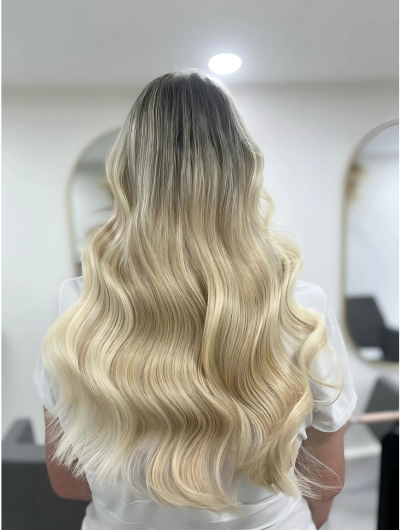
The short answer is yes — but with caveats. A sensitive scalp doesn’t automatically mean extensions are off the table, but it does mean you’ll need to be more selective. The type of extension, the way it’s applied, the weight of the hair, and even how you care for it afterwards will all play a role in whether the experience is comfortable or unbearable.
Think of it like choosing a pair of shoes. If your feet blister easily, you’re not going to opt for stiff leather boots without socks — you’ll choose something lightweight, breathable, and cushioned. The same logic applies here. Sensitive Scalp Solutions for extensions focus on minimising tension, avoiding harsh adhesives, and prioritising scalp-friendly techniques.

Extension Methods: Which Ones Work Best for Sensitive Scalps?
Not all extensions are created equal. Some are known for being heavy, tight, or reliant on strong glues — all of which can be a nightmare for a sensitive scalp. Others, however, are designed with comfort in mind. Choosing the right method and working with a trusted hair extension supplier can make all the difference. Let’s break down the most common options.
1. Clip-In Extensions
- Pros: Easy to apply and remove, no glue or heat involved, no long-term commitment.
- Cons: Clips can feel heavy or pinch if worn for long periods.
- Verdict: A good option for occasional wear, but not ideal for everyday use if your scalp is extremely sensitive.
2. Tape-In Extensions
- Pros: Lightweight, flat, and comfortable when applied correctly. No heat used.
- Cons: Adhesive tape may cause reactions if your scalp is prone to allergies.
- Verdict: Often considered one of the most scalp-friendly semi-permanent options. Works well as part of a tailored Sensitive Scalp Solution.
3. Micro-Ring or Micro-Bead Extensions
- Pros: No glue or heat, reusable, adjustable.
- Cons: Can pull on hair if fitted too tightly, beads may cause pressure points.
- Verdict: Great for some sensitive scalps if applied carefully, but not for those with very fragile hair or extreme tenderness.
4. Keratin-Bond (Hot Fusion) Extensions
- Pros: Long-lasting, natural-looking finish.
- Cons: Uses heat and glue, both of which may irritate sensitive scalps. Bonds can also feel bulky.
- Verdict: Generally not recommended as a Sensitive Scalp Solution.
5. Sew-In (Weave) Extensions
- Pros: Long-lasting, adds lots of volume.
- Cons: Requires tight braiding, which creates tension and can cause soreness.
- Verdict: Not ideal for anyone with a delicate scalp.
6. Halo Extensions
- Pros: No glue, no clips, no heat — just a comfortable invisible wire that sits around your head.
- Cons: Limited styling flexibility, can feel a little unusual at first.
- Verdict: One of the best Sensitive Scalp Solutions for occasional wear. Zero tension, zero irritation.
Key Factors to Consider Before Getting Extensions
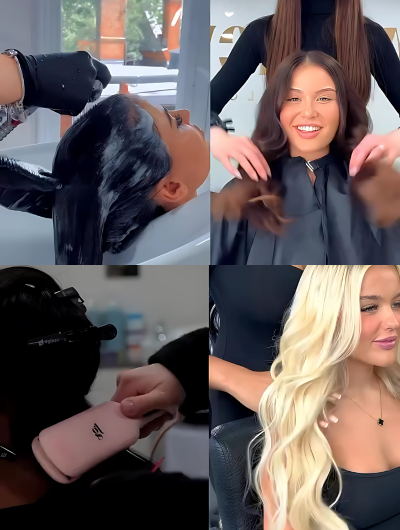
If you’re exploring Sensitive Scalp Solutions, here are the main things to keep in mind:
- Weight of the Hair – Heavy extensions will put more pressure on your scalp. Always choose lightweight, high-quality hair.
- Application Method – Adhesives, heat, or tight braiding are usually problematic for sensitive scalps. Look for gentle methods like halos or tape hair extensions.
- Maintenance – Sensitive scalps may react to certain shampoos or conditioners. Stick to sulphate-free, scalp-friendly products.
- Styling – Avoid very tight ponytails or buns which can increase tension and soreness.
Aftercare – Regular scalp massages (gentle ones!) can improve circulation and reduce sensitivity.

Practical Sensitive Scalp Solutions for Wearing Extensions Comfortably
Even once you’ve chosen the right method, there are extra steps you can take to make sure your extensions feel as comfortable as possible:
Patch Test First
If adhesives or tapes are involved, always do a patch test on your skin before committing. This way, you’ll know if you’re likely to have a reaction.
Start Small
Instead of a full head of extensions, try partial or half-head application first. This allows you to test your scalp’s tolerance without overwhelming it.
Go Professional
A skilled extensionist with experience in Sensitive Scalp Solutions is worth their weight in gold. They’ll know how to apply extensions without unnecessary tension and can adjust techniques to suit your scalp.
Prioritise Aftercare
- Use soothing scalp sprays or serums designed for sensitivity.
- Choose gentle, sulphate-free shampoos.
- Avoid scratching or tugging at your scalp, even if it itches.
Regular Check-Ins
Schedule follow-up appointments with your stylist to check that everything is sitting comfortably and not causing hidden damage.
When to Skip Extensions Altogether
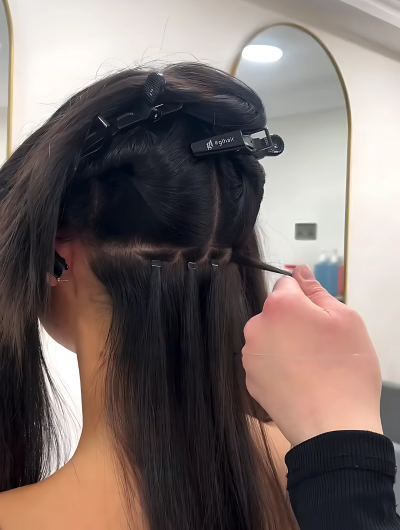
As much as we’d love to say extensions are always an option, there are times when they’re simply not the right choice. If you have an active scalp condition such as psoriasis flare-ups, open sores, or severe dermatitis, it’s better to focus on healing your scalp first. In these cases, wigs or halo extensions can provide a safe, stylish alternative while your scalp recovers.
Remember: the goal of Sensitive Scalp Solutions isn’t just about making extensions “work.” It’s about protecting your scalp health while still enjoying beautiful hair.

Alternatives to Traditional Extensions
If you decide extensions aren’t right for you at the moment, there are still plenty of ways to boost your look without irritating your scalp:
- Halo Extensions – as mentioned, lightweight and non-invasive.
- Toppers or Hairpieces – great for adding volume at the crown without touching your scalp directly.
- Wigs – modern wigs look incredibly natural and offer total styling freedom.
- Volumising Styling Tricks – think root-boosting sprays, strategic blow-drying, and layered cuts.
These alternatives often form part of a broader Sensitive Scalp Solution, giving you options that are both stylish and comfortable.
Finding the Right Balance
Having a sensitive scalp doesn’t mean giving up on extensions — it just means being a bit more strategic. With so many methods available today, plus scalp-friendly products and gentle aftercare routines, there are more Sensitive Scalp Solutions than ever before.
The key is to listen to your scalp, work with an experienced stylist, and never ignore signs of irritation. Your comfort and scalp health should always come first. Extensions are there to enhance your confidence and style — not to compromise your wellbeing.
So yes, you can absolutely wear extensions with a sensitive scalp. Just choose wisely, care for your scalp, and you’ll be able to enjoy the length and volume you’ve always wanted, without the discomfort.
FAQ
Can I wear extensions if I have a sensitive scalp?
Yes, you can. You just need to choose scalp-friendly methods such as tape-ins or halo extensions, which are lighter and gentler. The right Sensitive Scalp Solution will help you avoid irritation.
Which type of hair extensions are best for sensitive scalps?
Halo and tape-in extensions are usually the most comfortable. They’re lightweight and don’t rely on harsh adhesives or tight braiding, making them excellent Sensitive Scalp Solutions.
Will extensions make my scalp more sensitive?
Not necessarily. If fitted correctly and cared for properly, extensions shouldn’t worsen sensitivity. However, heavy or tightly applied methods can add pressure, so always go for gentle techniques.
What products should I use if I have a sensitive scalp with extensions?
Opt for sulphate-free shampoos, soothing scalp sprays, and lightweight conditioners. Harsh formulas can trigger reactions, so stick to products designed for sensitive skin.
How can I test if my scalp will react to extensions?
Do a patch test first, especially if adhesives are involved. You could also try a smaller application, like a half-head of extensions, before committing to a full set.
Should I see a professional for scalp-sensitive extensions?
Absolutely. An experienced stylist will know how to apply extensions with minimal tension and can tailor the method to your needs. DIY approaches often make sensitivity worse.

